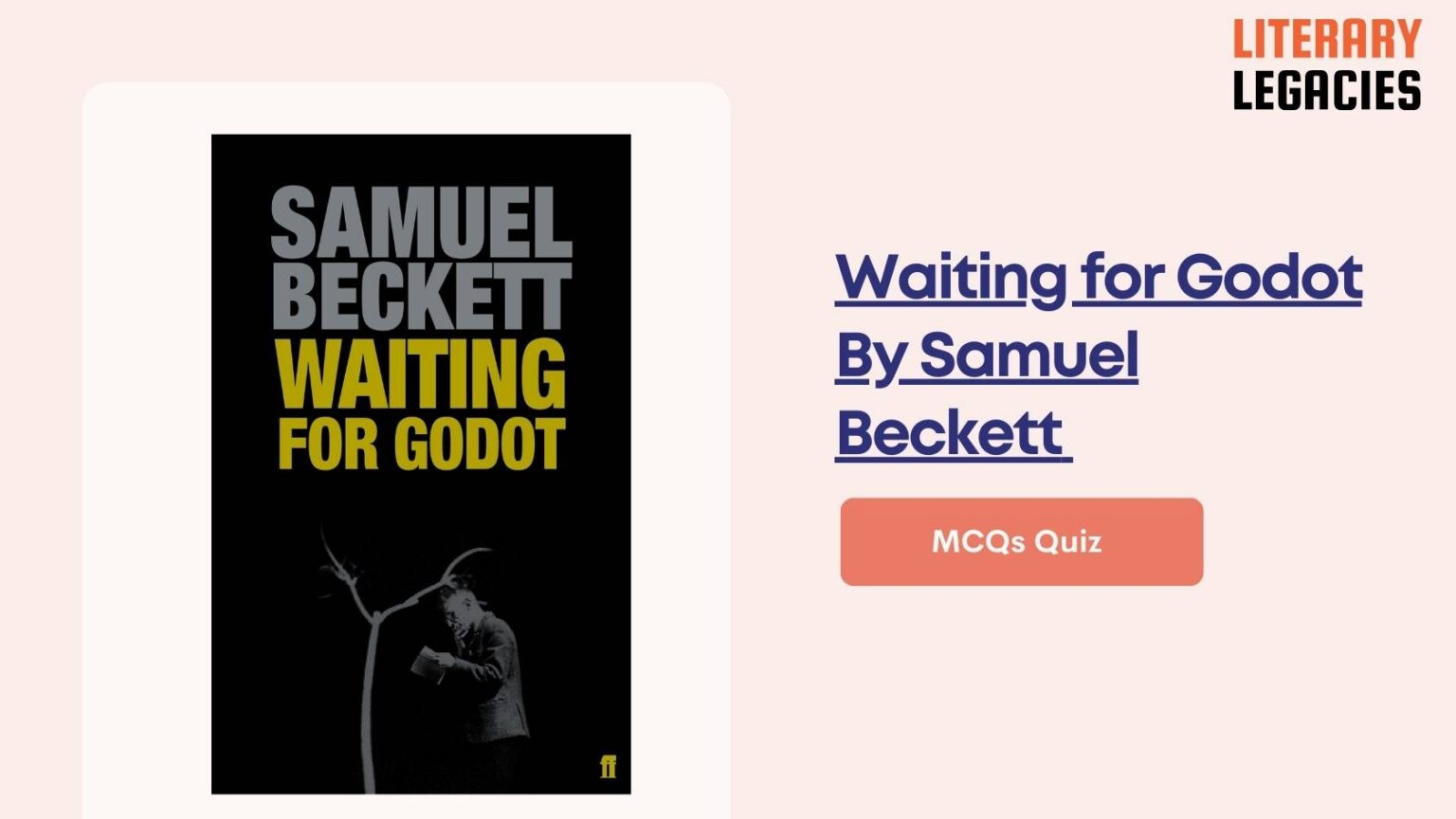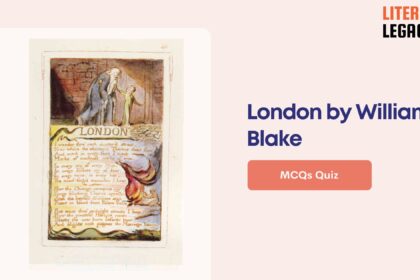1. What are Vladimir and Estragon waiting for near the tree?
A. A man named Godot
B. A messenger from Godot
C. Pozzo and Lucky
D. The market to open
Answer: A man named Godot (B)
They wait for Godot for two consecutive nights.
2. What does Lucky do to entertain Vladimir and Estragon?
A. Dances and thinks
B. Tells a joke
C. Does acrobatics
D. Sings a song
Answer: Dances and thinks (A)
Lucky’s abilities are showcased in this scene.
3. Why does Pozzo stop near Vladimir and Estragon?
A. To sell his slave, Lucky
B. To ask for directions
C. To rest for a while
D. To wait for Godot
Answer: To sell his slave, Lucky (A)
Pozzo is on his way to the market.
4. What does the boy tell Vladimir about Godot?
A. Godot will arrive tomorrow
B. Godot will not arrive tonight, but will surely come tomorrow
C. Godot will arrive tonight
D. Godot has already arrived
Answer: Godot will not arrive tonight, but will surely come tomorrow (B)
The boy is a messenger from Godot.
5. What happens to Pozzo in the second night?
A. He becomes dumb
B. He becomes mute
C. He becomes deaf
D. He becomes blind
Answer: He becomes blind (D)
Pozzo’s condition changes in the second night.
6. What do Vladimir and Estragon decide to do after the boy leaves in the second night?
A. Wait for Pozzo and Lucky
B. Leave, but they do not move
C. Sleep near the tree
D. Go to the market
Answer: Leave, but they do not move (B)
They decide to leave, but their inaction is a recurring theme.
7. What is the repetition in the play’s structure?
A. The boy arrives with the same message
B. Godot arrives in the second night
C. Vladimir and Estragon decide to leave, but do not move
D. Vladimir and Estragon meet Pozzo and Lucky
Answer: Vladimir and Estragon decide to leave, but do not move (C)
The play’s structure is characterized by this repetition.
8. What is the final action of the play?
A. Godot arrives
B. Vladimir and Estragon leave
C. Pozzo and Lucky return
D. The curtain falls
Answer: The curtain falls (D)
The play ends with the curtain falling.
9. What is the significance of Vladimir questioning the story of the two thieves in the Gospels?
A. To challenge the credibility of academia
B. To reevaluate the authority of biblical narratives
C. To demonstrate the authority of the Bible
D. To highlight the importance of companionship
Answer: To reevaluate the authority of biblical narratives (B)
This moment in the play highlights Vladimir’s skepticism towards traditional authority.
10. What is the purpose of Lucky’s speech in Act One?
A. To provide comic relief
B. To challenge the cultural authority of academia
C. To showcase the power of language
D. To illustrate the importance of companionship
Answer: To challenge the cultural authority of academia (B)
Lucky’s speech is a prime example of the failures of language in the play.
11. What is the result of the breakdown of communication between characters in the play?
A. The audience is immersed in the effects of inadequate language
B. The characters are able to form strong relationships
C. The characters are able to convey their thoughts effectively
D. The characters are able to find meaning in their lives
Answer: The audience is immersed in the effects of inadequate language (A)
The breakdown of communication highlights the inherent meaninglessness of language.
12. What is the significance of the dialogue in the play?
A. It shows the characters’ ability to communicate complex ideas
B. It demonstrates the power of language in conveying emotions
C. It argues that language fails to capture the reality of human experience
D. It highlights the importance of language in capturing human experience
Answer: It argues that language fails to capture the reality of human experience (C)
The dialogue in the play highlights the limitations of language.
13. What is the purpose of the repetition of lines in the play?
A. To emphasize the importance of the dialogue
B. To highlight the inherent meaninglessness of the characters’ words
C. To create a sense of rhythm and musicality
D. To demonstrate the logic of the dialogue
Answer: To highlight the inherent meaninglessness of the characters’ words (B)
The repetition of lines underscores the inability of language to capture reality.
14. What is the significance of the contrast between the dialogue and the characters’ actions?
A. It showcases the power of language in conveying emotions
B. It highlights the importance of language in shaping action
C. It demonstrates the characters’ ability to make decisions
D. It illustrates the inherent meaninglessness of the characters’ words
Answer: It illustrates the inherent meaninglessness of the characters’ words (D)
The contrast between dialogue and action highlights the disconnect between words and reality.
15. What is the significance of the paired characters in the play?
A. It demonstrates the power of language in conveying emotions
B. It emphasizes the importance of companionship in the face of suffering
C. It showcases the authority of academia
D. It highlights the importance of individuality
Answer: It emphasizes the importance of companionship in the face of suffering (B)
The paired characters in the play highlight the importance of companionship in the face of meaninglessness and suffering.
16. What is the result of the characters’ reliance on each other?
A. They are able to escape the sources of their suffering
B. They are able to endure the boredom and suffering
C. They are able to communicate effectively
D. They are able to find meaning in their lives
Answer: They are able to endure the boredom and suffering (B)
The characters’ reliance on each other allows them to endure their suffering, but also prevents them from escaping it.
17. What is the significance of the dynamic between Vladimir and Estragon?
A. It showcases the toxic moments of their relationship
B. It demonstrates the power of language in conveying emotions
C. It illustrates the positive and supportive aspects of companionship
D. It highlights the importance of individuality
Answer: It illustrates the positive and supportive aspects of companionship (C)
The dynamic between Vladimir and Estragon highlights the importance of companionship in the face of suffering.
18. What is the significance of the play’s exploration of language?
A. It demonstrates the power of language in conveying emotions
B. It highlights the importance of language in shaping reality
C. It argues that language is a reliable lens through which to view the world
D. It highlights the inherent meaninglessness of language
Answer: It highlights the inherent meaninglessness of language (D)
The play’s exploration of language highlights its limitations and inherent meaninglessness.
19. What is the central theme of Waiting for Godot and the Theatre of the Absurd?
A. The inherent meaninglessness of the universe
B. The importance of cultural authority
C. The power of friendship and human connection
D. The futility of human existence in a chaotic world
Answer: The inherent meaninglessness of the universe (A)
The Theatre of the Absurd emphasizes the absurdity and meaninglessness of human existence.
20. What is the purpose of Vladimir and Estragon’s actions in the play?
A. To pass the time and entertain themselves
B. To escape the waiting stage
C. To challenge cultural authority
D. To meet Godot and find meaning
Answer: To pass the time and entertain themselves (A)
Vladimir and Estragon’s actions, including their banter and run-in with Pozzo and Lucky, are ultimately pointless and fail to serve their primary goal of meeting Godot.
21. What is the significance of the circular nature of the plot in Waiting for Godot?
A. It highlights the importance of Godot’s arrival
B. It emphasizes the futility of their actions
C. It shows the progression of Vladimir and Estragon’s relationship
D. It demonstrates the power of human connection
Answer: It emphasizes the futility of their actions (B)
The circular nature of the plot suggests that nothing helps Vladimir and Estragon escape the waiting stage that they find themselves stuck in.
22. What is the implication of Vladimir and Estragon’s waiting for Godot?
A. Their lives are futile and lacking direction
B. Their lives are filled with purpose and meaning
C. Their lives are a reflection of the post-World War II era
D. Their lives are controlled by cultural authority
Answer: Their lives are futile and lacking direction (A)
By depicting Vladimir and Estragon’s waiting for Godot, Beckett suggests that their lives are ultimately futile and lacking direction.
23. What is the historical context in which Beckett wrote Waiting for Godot?
A. Pre-World War I era
B. Post-World War II era
C. During the Enlightenment
D. During the French Revolution
Answer: Post-World War II era (B)
Beckett wrote Waiting for Godot in the post-World War II era, a time of unprecedented chaos and uncertainty.
24. What is Beckett’s attitude towards cultural authority in Waiting for Godot?
A. Respectful and reverent
B. Critical and challenging
C. Indifferent and neutral
D. Admiring and emulative
Answer: Critical and challenging (B)
Beckett mocks and challenges typical sources of cultural authority such as religion, academia, and friendship in Waiting for Godot.
25. What is the tone of Waiting for Godot?
A. Absurd and meaningless
B. Light-hearted and comedic
C. Serious and somber
D. Tragic and despairing
Answer: Absurd and meaningless (A)
The tone of Waiting for Godot is absurd and meaningless, reflecting the play’s themes of futility and lack of direction.
26. What is the purpose of Pozzo and Lucky’s characters in the play?
A. To illustrate the absurdity of human existence
B. To represent cultural authority
C. To serve as foils to Vladimir and Estragon
D. To provide comic relief
Answer: To illustrate the absurdity of human existence (A)
Pozzo and Lucky’s characters help to illustrate the absurdity of human existence and the futility of Vladimir and Estragon’s actions.
27. What is the ultimate message of Waiting for Godot?
A. That cultural authority holds the key to meaning
B. That human existence has inherent meaning and purpose
C. That human existence is inherently meaningless and futile
D. That human connection can overcome absurdity
Answer: That human existence is inherently meaningless and futile (C)
The ultimate message of Waiting for Godot is that human existence is inherently meaningless and futile, and that finding purpose in a world full of chaos and uncertainty is an impossible act.
28. What is the role of the audience in Waiting for Godot?
A. To analyze the play’s themes and symbolism
B. To sympathize with Vladimir and Estragon’s plight
C. To wonder if Godot will ever arrive
D. To identify with the characters’ emotions
Answer: To wonder if Godot will ever arrive (C)
Beckett invites the audience to wonder if Godot will ever arrive, and this possibility renders Vladimir and Estragon’s entire lives futile.
29. What is the underlying fear of Vladimir when Estragon leaves or falls asleep?
A. Fear of Pozzo’s bullying
B. Fear of being abandoned by Godot
C. Fear of Lucky’s retaliation
D. Fear of the nothingness that he would face if he waited for Godot alone
Answer: Fear of the nothingness that he would face if he waited for Godot alone (D)
Vladimir’s fear of loneliness highlights his dependence on Estragon and their shared purpose.
30. How does Pozzo’s relationship with Lucky change in Act Two?
A. Their relationship remains unchanged
B. Lucky gains more freedom from Pozzo
C. Pozzo’s bullying of Lucky increases
D. Pozzo becomes more dependent on Lucky
Answer: Pozzo becomes more dependent on Lucky (D)
Pozzo’s blindness in Act Two leads to a shift in their dynamic, with Lucky providing support to Pozzo.
31. What motivates Pozzo’s behavior towards Lucky in Act One?
A. A need to prove his superiority
B. A desire to help Lucky
C. A fear of being overthrown
D. A sense of pity for Lucky
Answer: A need to prove his superiority (A)
Pozzo’s actions towards Lucky in Act One are driven by his need to assert his dominance and self-importance.
32. What is the significance of the physical bond between Pozzo and Lucky?
A. It is a mere stage prop
B. It provides a sense of certainty for Lucky
C. It represents their deep emotional connection
D. It serves as a symbol of their shared purpose
Answer: It provides a sense of certainty for Lucky (B)
Despite the abusive nature of their relationship, the physical bond between Pozzo and Lucky provides Lucky with a sense of stability.
33. What is the primary difference between the relationships of Vladimir and Estragon and Pozzo and Lucky?
A. One is a fleeting encounter, the other a lifelong bond
B. One is based on mutual respect, the other on dominance
C. One is a romantic relationship, the other a friendship
D. One is characterized by silence, the other by constant conversation
Answer: One is based on mutual respect, the other on dominance (B)
The two relationships are distinct in their power dynamics, with Vladimir and Estragon being more equal and Pozzo holding power over Lucky.
34. What is the result of Pozzo’s sudden blindness in Act Two?
A. He starts to question the meaning of life
B. He suffers and becomes more dependent on Lucky
C. He becomes more confident and self-assured
D. He begins to treat Lucky with kindness
Answer: He suffers and becomes more dependent on Lucky (B)
Pozzo’s blindness in Act Two leads to his downfall and increased reliance on Lucky.
35. What is the tone of Vladimir’s expressions of loneliness?
A. Fearful and desperate
B. Angry and resentful
C. Indifferent and apathetic
D. Melancholic and introspective
Answer: Fearful and desperate (A)
Vladimir’s expressions of loneliness convey his deep-seated fear of being alone and abandoned.
36. How does Vladimir’s dependence on Estragon reflect the themes of the play?
A. It underscores the cruelty of Pozzo’s treatment of Lucky
B. It highlights the importance of human connection
C. It demonstrates the superficiality of relationships
D. It emphasizes the futility of waiting for Godot
Answer: It highlights the importance of human connection (B)
Vladimir’s dependence on Estragon illustrates the human need for connection and stability in a seemingly meaningless world.
37. What is the main consequence of Pozzo’s actions towards Lucky in Act One?
A. Lucky becomes more confident and assertive
B. Their relationship becomes more equal and balanced
C. Pozzo’s sense of self-importance is bolstered
D. Lucky’s sense of self-worth is destroyed
Answer: Pozzo’s sense of self-importance is bolstered (C)
Pozzo’s actions towards Lucky in Act One serve to reinforce his own sense of superiority and self-importance.
38. What is the significance of the relationships between the characters in the play?
A. They provide a sense of hope and optimism
B. They are a mere backdrop for the plot
C. They offer a means of escape from the bleak world
D. They provide a source of stability and connection in a meaningless universe
Answer: They provide a source of stability and connection in a meaningless universe (D)
The relationships between the characters in the play serve as a source of stability and connection in an otherwise bleak and meaningless world.



